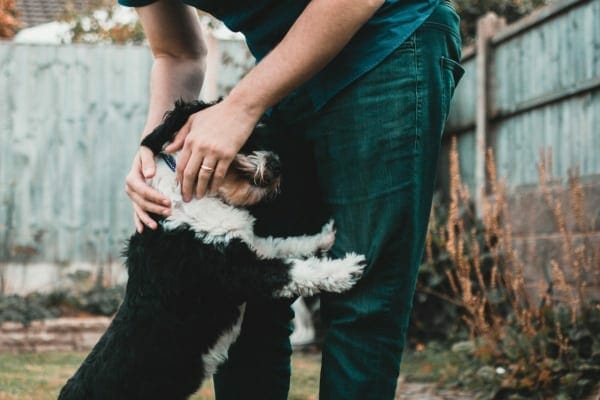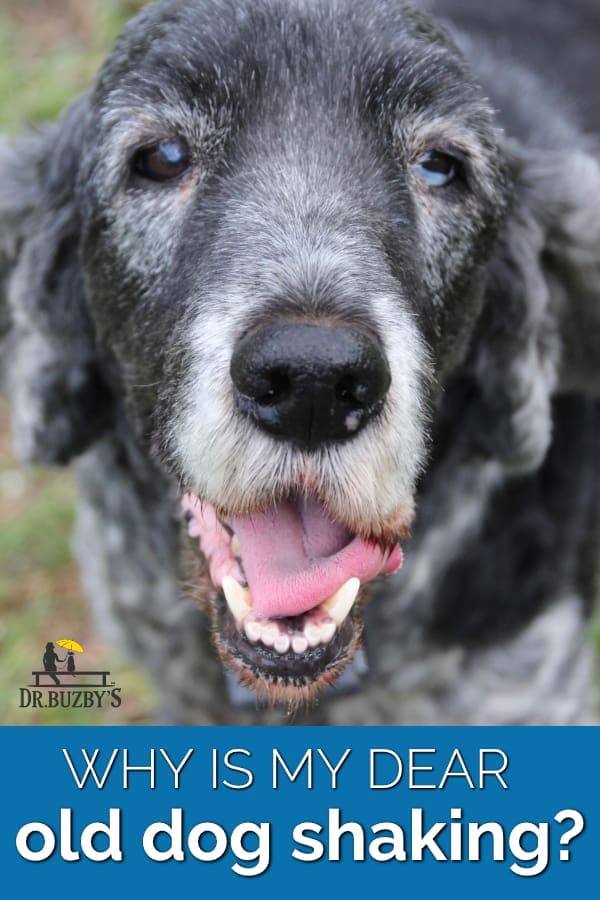SUMMARY: Your beloved old dog is shaking. Is this normal? Veterinarians Dr. Erica Irish and Dr. Julie Buzby have answers and actionable tips. Through a case study of Dr. Irish’s elderly dog, you’ll learn 11 common reasons why senior dogs shake, shiver, and tremble.

Why is my old dog shaking?
Lately, my 13-year-old Dachshund, Bailey, has been jumping onto my lap and shaking more often than usual. Since developing arthritis a few years ago, he’d adopted this routine as his way of saying, “Please let me go out to potty, or I’m going to burst!” However, now he was routinely hopping onto my lap and shaking, even if he’d just gone to the bathroom a few minutes prior.
I looked into my beloved companion’s eyes and wondered, “What is he telling me? Why is my little old dog shaking?” As a veterinarian, I knew that diagnosing the cause of shaking in an older dog can be tricky. I’d need to give Bailey a thorough exam and rule out many conditions so that I could help him. I’d start with the most common reasons senior dogs shake.

11 reasons why old dogs shake
Shaking or trembling in senior dogs can be caused by a very long list of conditions, but a handful of diagnoses rise to the top of the list. Here are 11 reasons for old dog shaking (in no particular order):
1. Excitement
Even an older dog can still get excited when his family comes home! Sometimes this excitement seems to exude right out of the dog’s pores and shaking or trembling ensues. Along the same lines, it is also possible for senior dogs to experience trembling and shivering when they are about to enjoy their favorite treat or play with their favorite toy.

2. Medications/toxins
Several medications can cause tremoring as a side effect by altering the balance of neurotransmitters in the nervous system. Though the mechanism for causing shaking is different, toxins can do the same. Common offenders include chocolate, xylitol, and pesticides.
PRO TIP: If you ever suspect that your dog has gotten into a known toxin in your home, grab the box/container and take it with you to the vet to facilitate diagnosis and treatment.
3. Addison’s disease
Even though Addison’s is most commonly diagnosed in 4 to 5-year-old dogs, dogs of any age can be affected. Addison’s disease makes our list because if left untreated, it is a life-threatening condition.
Dogs with Addison’s can appear very sluggish and experience vomiting, diarrhea, weight loss, loss of appetite, shaking, and hair loss. The symptoms are often vague, nonspecific, and come and go. Dogs with Addison’s do not produce enough cortisol—a hormone made by the adrenal glands that helps dogs respond to stress and regulate blood sugar levels.
If your dog has clinical signs mentioned above, contact your veterinarian. She will likely recommend blood and urine testing to screen for Addison’s disease and other illnesses.
4. Cold (hypothermia)
If your dog suddenly starts to shiver while out in the yard and the mercury has dropped, then he may simply need a sweater! Dogs can shiver and shake due to the cold just like humans. To prevent this, make sure your dog has warm bedding and protective clothing during the cold months of the year.

5. Nausea
Nausea can be caused by numerous health conditions—infection, poisoning, liver disease, and kidney disease, to name a few. A nauseous dog is not necessarily a vomiting dog. More subtle signs of nausea include:
- lip smacking
- shaking
- panting
- excessive swallowing
- drooling
If you’re concerned about your dog showing signs of tummy upset, contact your veterinarian. Depending on the history and exam findings, your vet may recommend blood and urine testing to identify a cause. Routine lab work is especially important in senior dogs in order to detect disorders as early as possible, such as chronic kidney disease. (To learn more about collecting lab samples at home, please read 7 Tips for Improving Your Dog’s Lab Tests.)
6. Neurologic disease
Dogs with certain brain diseases can develop tremors and sometimes even seizures. Infection and/or inflammation of the central nervous system may be difficult to diagnose on routine testing. For this reason, your veterinarian may recommend referral to a veterinary neurologist for evaluation and more specialized testing. Neurologic disease always has to be on the rule-out list when a senior dog suddenly starts trembling or shaking, but it’s important to remember that it is only one of many reasons for this symptom.
7. Generalized tremor syndrome (GTS)
This tremor-causing condition can occur in any size and color of dog, but it’s also known as white dog shaker syndrome, because it is diagnosed most commonly in small, white breeds (especially the Maltese, the West Highland White Terrier, and the Bichon Frise). The tremors can be localized to the head or generalized—affecting the entire body. While the cause is unknown, there are some theories suggesting that the immune system plays a role. Steroid medications like prednisone are prescribed for treatment. While GTS mostly affects young dogs, because dogs have lifelong signs, older dogs can manifest symptoms too.

8. Pain
If your older dog shivers or shakes, especially in the hind end, he may be exhibiting one of the signs of pain due to canine arthritis. Dogs can also experience generalized pain due to infection, injury, and even dental disease. Depending on the source of pain, your veterinarian might recommend further diagnostic testing and/or prescribe pain medication. If arthritis is suspected, our comprehensive guide, How to Relieve Arthritis Pain in Dogs, is a helpful resource.

9. Idiopathic
The term idiopathic comes from Greek roots and literally translates as “private disease,” but we use it commonly in medicine to mean “of unknown cause.” There are many idiopathic conditions in veterinary medicine, ranging from seizures to vestibular disease. The term can be associated with tremoring in older dogs too.
Unfortunately, idiopathic old dog tremor syndrome is—like all idiopathic mysteries—a diagnosis of exclusion. In other words, veterinarians rule out everything else and then are left with idiopathic disease as the fall-back explanation.
If your senior dog exhibits shaking hind legs and the problem has not developed into progressive neurologic disease and your vet has ruled out other common diagnoses, then you may be left with this diagnosis, which is not bad news. It is considered a benign condition.
10. Anxiety and fear
Like people, dogs can shake when they’re afraid or anxious. Some dogs can be afraid of loud sounds like thunderstorms or fireworks. For senior dogs, problems like vision loss due to cataracts and hearing loss can alter their confidence and personality and make them more likely to tremble.

11. Canine cognitive dysfunction
Another cause of shaking in older dogs is canine cognitive dysfunction (CCD). Dogs with CCD can become more anxious and restless, especially at night. For more information about this common condition that afflicts senior dogs, check out Managing Canine Cognitive Dysfunction in Dogs: Signs, Symptoms, Solutions.
When to see the vet
You know your dog better than anyone. If your grey-muzzled companion is experiencing shaking and trembling, make an appointment with your veterinarian today. Early diagnosis almost always yields better outcomes.
In addition to performing a thorough physical exam, your vet will want to gather some key information to formulate a “rule out” list. By carefully observing your dog’s symptoms, you can help your veterinarian narrow down the diagnosis. Be prepared to answer questions like these:
1. Is the shaking/trembling episodic—meaning does it come and go? Or is it ongoing and continuous?
2. Does the shaking/trembling change with your dog’s activity level? In other words, is it worse with activity and better at rest?
PRO TIP: We’ve all heard the joke about your car suddenly not having the “symptom” you made the appointment for, as soon as you pull up to the mechanic’s garage to have it checked out. The same phenomenon occurs in veterinary medicine! Take a video of your old dog shaking to show your veterinarian in case the patient looks different in the exam room than at home. We believe it will be exceedingly valuable for your vet to see exactly what you see at home. Thanks to the modern cell phone camera, this is easy homework.
What was the underlying cause behind Bailey’s shaking?
In the case of Bailey, I brought him to our hospital for testing to screen for some of the problems outlined above. Thankfully, all his results came back within normal limits! We determined that his “old dog shaking” occurred mostly at night due to anxiety and CCD. I’ve intentionally made some changes in our nighttime routine, and I started him on a prescription diet for older dogs, plus a supplement for calming. I’m happy to report that his shaking has greatly improved!

Does your dear old dog shake or shiver?
Please comment below. We can all learn from each other.


Our 13 year old Chi/Jack Russell has started shivering on and off during the day. I wondered whether it has anything to do with him suddenly becoming quite deaf? It must be confusing for him. He is on prednisolone and librela, eats very well and has monthly check ups at the vet. The vet seems to think it is breed associated
Hi Jacqui,
I understand your concern for your senior pup with this shivering he has started to display. Your vet is right, it can be breed related but also there are many other things that can contribute to this situation. While you may never know the exact cause, it sounds like you are doing everything you can to ensure he is comfortable and happy. Wishing you both all the best and keep up the good work!
my elderly Jack Russel X Chi has level 6 heart murmur had 2 seizures and his eating went down hill last year after a bout of hives he had for a week and it really took the stuffing out of him. we have tried him with everything mostly out food because he he didn’t like our food. then he started eating dog food again but only 2/100gr pouches a day. now he won’t eat dog food or our food maybe a handful at best a day. he is on frusemide 2 x a day and pimobandan 2x a day. he is 15 in August of this year and we just don’t know what the next step is. I gave him his bath yesterday and he had a funny 5 minutes didn’t think anything was wrong but then he just won’t eat. and he is losing weight . he is sleeping all day long. sometimes peeing himself in his sleep. I just don’t want to say good bye if it’s not his time yet but I don’t know what I can give him to make him eat. I tried chicken, beef, lamb , ham salmon , salmon potato mix , chicken battered burgers , fish cakes , pasta, scotch eggs . eggs . homemade vegetable meat dog food mix . fish rice . just fish just rice ,porridge, yogurt cheese. he is eating dog treats at a push. I roasted him some butter nut squash with lamb and beef he takes a few bites have a couple then spits it out. we have had his teeth done before Christmas of 2023. because we thought maybe his teeth. we just don’t know. he is my best friend we have been through so much , i feel I keep hanging on for me because I can’t say goodbye. i wish he would eat.
Dear Invisiblevoilet,
My heart goes out to you as you face this difficult situation with your senior pup. I know you would do anything you could to improve his quality of life and give him more time, but sometimes that just isn’t how things work out. It sounds like your boy is struggling and may be nearing the end of his days. Saying goodbye might be the most loving option and only way to give him freedom and peace. I will attach links to other articles with more information and great advice from other readers. Hoping you can find the answers you need to make the best choice for everyone involved. Bless you and your sweet boy. ♥
1. Using a Quality of Life Scale for Dogs
2. Signs Your Dog is Dying: A Caring Message to Bring You Peace
3. How Will You Know When It’s Time to Euthanize Your Dog? 5 Caring, Heartfelt Messages
4. Preparing for Your Dog’s Euthanasia: 10 Thoughts for Peace
I have been given a 11yrs old jack russell 2 weeks ago. she seems in good health very active and happy to meet people and other animals. she randomly start shaking head to toe. I’m worried it could be something bad. what do you think I should do?
Hi Candy,
I commend you for taking in an older pup and offering them a loving home for their senior years. I understand your concern with this strange shaking behavior but can’t make specific conclusions without examining your girl myself. I encourage you to schedule an appointment with your vet and get her evaluated. Anytime you have concerns or new behaviors emerge, it is a good idea to get an exam performed. Hoping all is well and wishing you many happy years together. ♥
We have an 11 year mini labradoodle who has started getting nervous and anxious when we receive text messages. She crawls under chairs and knocks over planters. She has always disliked fireworks but texts never bothered her. Any suggestions on changing this behavior.
Hi Ritch,
This is such a strange situation. I am not sure I have heard of this issue before. Have you tried changing the ring tone or sound your phone makes for the text messages to see if a different sound gets the same reaction? Could you turn your phone to vibrate only when at home around your pup? Does your dog associate your phone’s sound with something negative (like an alarm going off and then you leaving the house)? You may need to reach out to a veterinary behaviorist for expert advice. Hoping you can find a way to give your girl peace and comfort in your home.
Thank you, we have tried a large amount of the tones. So far we have not hit the magic one. We just can’t understand why after 11 years it now bothers her.
Hi, vet tech here. Our 14 yo labrador flat coat mix has done this since about 5yo! Would love to chat more. We’ve been to behaviorists, training, neuro etc.
My 14 year old Airedale will shiver when he’s starting to have a Lupus flare up. After a course of Prednisone for a day or two he’s fine. That’s one way now I can tell
Hi Linda,
That is very interesting! Thank you for sharing with us.
Hi. My 10 yr old Chihuahua sleeps in our bed, under the cover. He wakes up after sleeping several hrs, at night and wants to sleep on my pillow above my head. This has happened sporadically in the past, but it has become a nightly occurrence. I get him down and try to console and reassure him. He wants to stay outside the cover, but shivers. I want to help him be comfortable and feel safe. What can I do?
Hi Susan,
I understand your concern for your little guy and know you want to do what is best. Without witnessing the behavior, myself it is hard to make specific recommendations. I am not sure his shivering is due to discomfort or fear. Some little pups just tremble without cause. If he is looking for a spot of his own outside of the covers, maybe you could put a blanket near the foot of your bed and see if he would want to snuggle in that area instead of your pillow? As always, it is a good idea to mention this behavior to your vet. They can make sure your senior boy is healthy and there are no worrisome medical causes to investigate. Hoping all is well. Wishing you and your sweet boy the best.
My pit bull does this too. He has dementia and is probably close to 13 (he is a rescue). He likes to sleep on top by the pillows, it’s a new thing, has done it the past 6 months. I feel like they feel cocooned and safe over there.
Dear Dr. Buzby:
I believe my 13-yr. old dog may have the same problem your dog has/had.
Could you tell me specifically what medications and supplements you used?
You also mentioned a collar in one of your responses above.
Please advise.
Tatiana
Hi Tatiana,
Bailey, the dog mentioned in the article, actually belonged to Dr.Irish. She did not specifically mention what food or supplement she used for him. If I had to guess, the prescription food was probably something for neuro care to help with brain function in dogs with CCD. There are several options for calming supplements available for dogs. There are a few that can only be obtained from a veterinarian, but several others that are found in pet supply stores. The collar that I wrote about in another response was an ADAPTIL collar. This is a brand name product but there are also generic products on the market as well. DAP stands for dog appeasing pheromone, and this is used to help give dogs a sense of calm and comfort. This same pheromone has been formulated into treats, sprays, wipes, and diffusers. I hope this helps a bit. Good luck!
I’ve found that specific music greatly calms my 11 yr old mini-schnauzer, who has and has always had, anxiety (separation, etc and intermittent tremors).
Google ‘senior dog relaxing/calming music’. The one that I found is below. Good luck.
https://youtu.be/mQKO3voWbnM
Hi Lilly,
This is a wonderful idea. Thank you for sharing!
My nearly 16 yo Bearded Collie bitch is relatively ok health-wise except for arthritis but a daily small dose of hemp seed oil has had a wonderful affect – she is now very comfortable and more active. However a couple of nights in the past week when all is quiet and the other dogs and cat are asleep awaiting my bedtime – and she seems to be sound asleep also she will start having trembling episodes from mild and short to quite strong – her feet twitch and she seems to tense herself although she is asleep – almost unconscious. I am quite worried and can’t afford the multiple tests my vet will prescribe. For the rest of the day she is happy and quite normal – eats well and all other functions seem to be trouble free. Can you please give me some suggestions – I would be grateful…thank you
Hi Brenda,
I understand your concern for your senior girl and these trembling issues you have witnessed. Without personally examining her or seeing these tremors myself, I can’t make specific conclusions. The fact that this is all happening while your dog is asleep has me suspicious that you are seeing “normal” dreaming behaviors that maybe just haven’t been as apparent in the past. It could be very helpful if you can catch one of these episodes on video for your vet to evaluate. Ultimately, it is your decision whether to pursue testing or just continue to monitor things at home. Even if your vet recommends a test, you can always decline and ask to pursue other options. I do think it would be best to discuss this concern with your vet and get their opinion about your sweet girl. I am hopeful all is well and there will be many happy days ahead.
Hi Amanda,
i have a 13 yewr old jack russel terrier and she is on medication for her heart, lately she has started trembling, i originally put it down to the weather change so i turned up the heat a little to keep her warm shes still able to jump and run but shes shaking alot. she also does this thing where she coughs and chokes as if she has something lodged in her throat but she never gets sick and never has something lodged in there, its getting more freequent and im not sure if we should up the dossage on the meds or change her heart condition meds completely
Hi Ella,
These are great questions. Have you discussed your concerns with your vet? I do think what you are describing needs to be investigated. You also have the option to schedule a consult with a veterinary cardiologist and get their expert opinion on your dog’s specific situation. I am hopeful you will find the answers you need to make the best choice for your senior girl. Best wishes to you both.
My dog has lung cancer and is 26 years old, he is getting put down tomorrow and I noticed that when he breathes in his body shakes, but it’s fine breathing out ,just wanted to know why this was happening , I know he will be gone by the time you respond but we have a puppy and his family has lung issues(cancer ) and we just wanted to know if it had anything to do with it
Dear Sara,
I am sorry you had to say goodbye to your senior boy yesterday. Since I did not witness the shaking myself, it is hard to make specific conclusions about what the cause could have been. Shaking while exhaling (breathing out) can be a sign of difficulty breathing or pain. Both of those issues would be common with cancer of any type, but especially lung cancer. I hope your puppy can avoid this in his future. Wishing you all the best and for you to find comfort in the wonderful memories you made with your sweet guy over the last 26 years!
My 19 yr old Dachshund has CCD and Arthritis. I give her a joint supplement, Prozac, and Tramadol every 12 hours. But she still shakes intermittently. When I put a heating pad on her back she stops. Do you think it’s probably pain related or a combination of pain and the CCD? I’m so torn over having her euthanized. I know her days are numbered but I want to keep her as long as I can as long as she is comfortable. She still wags her tail, eats well and pees/poops just fine. What would you do?
Dear Debby,
I am sorry your Dachshund is having issues with arthritis and CCD. Unfortunately, without examining her myself, it is hard to make specific conclusions and recommendations. I encourage you to reach out to your vet for advice and support. They can perform a quality-of-life exam and give their honest opinion on your girl’s condition. Hoping you can get some answers and feel confident in your decisions as you continue down this unknown path. Best wishes and bless you both. ♥
Hello,
I have a 11yr old Havanese rescued at 10 wks old. He has always been afraid of fireworks and thunderstorms as he’s aged its been getting worse. I usually try to put him in area with load TV or music on to drown out the noise. Ive also taken him for car rides to avoid the noises, but the other day someone let off a very loud firework (loud enough to shake ground) and he litterly lost use of his front paws to lift his head. it was so scary I immediatly picked him up and comfort him and within 5 mins he had full use again. I dont know what I can do to avoid this and I am scared he is only going to get worse please help
thank you
AManda
Hi Amanda,
I am so sorry your little pup was scared so badly by the fireworks the other day. I know how heartbreaking it can be to watch them suffer from anxiety and feel helpless to intervene. Noise phobias can be tricky because they are somewhat unpredictable. I recommend you talk to your vet about these concerns. They may want to do some testing just to rule out seizure activity with this latest episode. They can also let you know if an anxiety medication would be appropriate for your dog’s specific case. You can also try calming wraps such as a thunder shirt and calming supplements/treats. I hope you can find the right solution to help restore peace for your sweet boy. Wishing you both the best.
My 12-year-old mixed spaniel (about 22 pounds) has always been a nervous dog and is very protective of me. It’s been just the 2 of us for several years. I recently had to move in with a friend who has 4 inside dogs and my Lucy seems to get along with them for the most part. My friend yells at her dogs a lot cause they have accidents in the house and bark a lot and my Lucy has started shaking in her back legs a lot. She seems most at ease and relaxed when she is either sitting beside me or lying down with me. Otherwise, she pretty much constantly shakes and does not like covers on her. I feel so bad for her.
Hi Luella,
I understand your concern for your senior girl with these new anxiety symptoms. It is common to see some stress when there are big changes to a dog’s lifestyle or environment. It might be a good idea to talk to your vet and discuss your concerns. They may be able to prescribe an anti-anxiety medication to help your girl during her adjustment period. There are also supplements and calming treats and collars that may be of some help. I hope you can find the solution that works for you and your dog and allows you both to live your lives to the fullest.
Hi, my Chihuahua Bella is almost 15 a year ago she had 2 episodes where she just fainted for no reason her Vet said it was her heart so she’s been on 2 meds she also says she probably has Crushing since she has a pot belly & drinks a lot , it’s been a year since her fainting she now as had 2 more when she gets excited and coughs I think there seizures she’s poo & wet on me during a bad one but now she’s started shacking real bad first thing in the morning and in middle of the nightI thought maybe she’s in pain, she can’t hear and has Cataracs but can still see she is going back to a different Vet in a few days her regular Vet has suggested maybe I need to think about putting her down this was before the last 2 seizures I just started five days ago Bella is still eating & sometimes wants to play it’s just I don’t know why she shakes so much.
I forgot to mention Bella has Pancreatis.
Hi Jodonna,
I am sorry your poor Bella is suffering so much. It does sound like she is quite a complicated case with many different issues. Shaking can be a symptom of multiple different conditions, and since I have not examined your dog myself, I can’t make a specific diagnosis. Unfortunately, it sounds like Bella may be nearing the end of her life and euthanasia might be the only thing that could give her peace and rest. Making the decision to say goodbye is very difficult. I don’t think it is a bad idea to get a second opinion, especially if you are struggling with the decision or need additional reassurance. I will attach some links to other articles that may offer additional help. Best wishes.
1. Signs Your Dog is Dying: A Caring Message to Bring You Peace
2. Dog Hospice Care Can Bring Peace and Dignity to Your Dog’s Final Days
3. Preparing for Your Dog’s Euthanasia: 10 Thoughts for Peace
4. Dog Euthanasia: Knowing When to Say Goodbye
5. In-Home Dog Euthanasia: Heartfelt Answers to 12 FAQs
I have a 16 year old mixed breed terrier. He always shakes when he is frightened or anxious. Today he started continuously shaking for no apparent reason. I got a blanket and wrapped him up thinking it would help, but he still continues to shake. He is not on any medications and is normally a spunky little guy!
Hi Tracy,
Sorry to hear that your dog is shaking more than usual today. If the shaking continues, I would recommend making an appointment with your vet to be safe. Things can change quickly for a 16 year old dog. Hope you can get to the bottom of his shaking and he can get back to being his usual spunky self soon!
My 17 year old cockapoo has always had severe thunderstorm anxiety, but a few nights ago he started to act as though there was a thunderstorm as soon as the lights went out for bedtime. This has occurred every night since, even though there have been no storms. I’m wondering if this could be a case of CCD?
Hi Kim,
It can be so difficult for everyone when our sweet pups start acting anxious at night. There are a variety of reasons for nighttime anxiety (which I discuss in my blog Senior Dog Anxiety at Night? 6 Solutions for Better Sleep) and CCD is definitely one of them. You can also learn more about the signs of CCD in my blog 5 Signs of Dementia in Dogs and What to Do About Them. I would recommend that you make an appointment for your dog with your veterinarian so he or she can do a complete medical evaluation to rule in/out any medical problems and discuss the next steps for helping you and your dog have more peaceful nights. Hope you find some answers and solutions soon! ❤
My 13 year old min pin in the last 3 days has been shaking off and on never has done this befor also the tinyest of a poo why
Hi Gigi,
I know you are worried about your dog. Unfortunately, since I have not personally examined your dog, I can’t give any specific recommendations. The symptoms you are describing could be attributed to many different issues or may be completely normal. My advice is to contact your vet and have your dog examined and discuss your concerns. I hope you find the answers you are looking for. Best wishes!
We have 16 year old white mini schnauzer. Currently she’s on medication for heart and protein issues. She has a vet appointment next month on the 21st for a full work up. She has started shaking several mornings within the week. We also noticed that her bowels are totally runny. After she does her business several times in the morning all shaking stops. Any ideas as to why the shaking? Thanks
Hi Deborah,
Sorry to hear that your sweet pup is having some runny stool and shaking episodes. Is there a chance you would be able to move her vet appointment up a bit so she can be evaluated sooner? It would be better to address her runny stool sooner rather than later. I could speculate that the shaking could be due to pain from GI cramps associated with diarrhea or perhaps some anxiety around the sudden urge to defecate, but that would be just that – speculation. There are really dozens and dozens of possibilities here, so it’s impossible to provide sound advice in messages like this. I think that having her evaluated by your veterinarian so he/she can do a complete physical exam and diagnostic tests (as needed) would be the best way to get to the bottom of the issue. I hope you are able to find some answers for her.❤
This is so helpful!
We got our rescue cockapoo, Freckles, as a senior dog, possible age 13-14. I first noticed his shivering when we went for a ride in the car, thinking he was fearful. Eventually he learned we are probably going someplace fun, so the shivering is not so prominent now.
But then, about a year ago, he had an ear infection that wouldn’t go away. On further inspection, my dear vet found a cancerous tumor in the canal and removed it. He suspected that the tumor would grow back but so far, he’s doing well – no sign of tumor! Yay!
However, this morning he was snuggled up in a blanket, asleep in my chair, and he started shivering. I carefully cuddled him and spoke comfortingly in a low tone but he didn’t wake up. I lifted both his eyelids. Nothing strange there except that when I dropped his lids he seemed to go back to sleep, still shivering. Within a minute he was awake and began his normal routine.
I am aware that the cancerous tumor could be growing in his head where we can’t see it. Still, when he’s not sleeping he is wiggling and happy and interested in what’s happening, following me around the house and barking at passersby on the street.
As a precaution, I’ll make an appointment with my vet, but I don’t think there’s anything in particular to do for him. I’ll ask about CBD oil, or maybe something to calm him – he doesn’t see or hear very well anymore. It’s possible he’s 18 years old! So we will justt enjoy our days as long as we can. It’s a good life together and I’m grateful.
Thanks so much for this site and the comments, too!
Hi Abby,
First of all, I love that you rescued a senior dog, because these sweet old guys and gals have so much love left to give and deserve to live out their golden years with a loving family like yours. I think you are absolutely on the right track to make an appointment with your veterinarian to try to get to the bottom of your dog’s shaking, and I hope you are able to figure out what is going on and how you can continue to help him keep living his best life as long as possible. I noticed you said he is going blind, so I wanted to mention that ToeGrips might be worth a try because they have significantly helped some of my blind or visually impaired patients move around with more confidence. I couldn’t agree more when you say “It’s a good life together and I’m grateful” because that is a fantastic motto for everyone. I’m glad the blogs and comments were helpful to you and wish you and your sweet pup all the best. ❤
My 12 year old dog has shaky back legs when running or occasionally standing but his front right leg trembles sitting down. What could this be?
Hi Claire,
I’m sorry to hear your lab is having issues with shaking or trembling legs. Unfortunately, without being able to examine him I can’t tell you which of the causes in the article is the culprit. I would recommend you schedule an examination with your veterinarian so they can help get to the bottom of his shaking. I hope you are able to find some answers for your sweet dog.
My older (maybe 15) Lab-Corgi mix has started shaking/trembling all over his body the last few weeks. It happens at different times throughout the day and for various amounts of time. He is usually standing and at some point might put his rear end down, but for the last 30 minutes I have had him laying snuggled in bed with me. This time, I thought he was cold since he had just come in…but clearly that was not the case after 10 minutes of being warmed under the covers and the shaking has continued. He does not have issues with any pain that we can figure out…sometimes a harder rub near the right ear might get a whelp with a new friend though, so we are sensitive to that.
Otherwise, no bladder/bowel issues, eating is lighter – but still eats, loves water, can’t go for long walks or jump like he used to, naps are definitely longer and more often these days too. He does have a noticeably stronger/different smell lately as well…
Hope this adds to the research. Vets and labs are just not in the budget right now…
Hi Kristine,
It can definitely be hard to narrow down the cause of shaking/trembling fits and it sounds like you are doing a good job of trying to observe your dog and find a reason for the shaking. Unfortunately I do think with the shaking plus the strong smell, backing off on eating, and sleeping more, he needs to be evaluated by a veterinarian. I know you mentioned the budget is tight, so I would recommend seeing if there are any low cost clinics in your area where he can be seen.
My 12 year old vizsla cross shakes in the mornings all over. She had a check up at the vets and nothing showed up. She used to have nodding fits and she reverse sneezes sometimes also she had her ear canal removed sue to cancer when she was 9. I am thinking it might be CCD as she does lose her bearings on walks and will run up to people who look like us! She also wakes in the night, barking, needs a cuddle and then settles. I do wonder if I should get more/different tests?
Hello Alex, Yes! Please discuss this with your veterinarian. I do think a diagnostic work up is in order, with the hope that you could then go on to treat appropriately and improve the situation. I know these scenarios that you describe are hard on both the dog and their humans, so I’d encourage you to be proactive about getting your senior dog help. Thanks!
My 10 year old Shitzu/poodle just started this occasionally. Not everyday but nothing can be happening at all and he starts shaking , from the inside out!
The vet did blood work today . She’s curious and thinks it might be early dementia. It doesn’t happen a lot , but it happened this morning while he was laying in the sun on our lanai.
Hello Lee, Yes, it’s difficult because there are so many things that can cause this and some are diagnosed by process of elimination. I would definitely follow up with your vet for next steps after the bloodwork. All the best to you both! 🙂
My Daughter’s geriatric lab and my geriatric Corgi both started acting scared and shaking they would climb all over our legs trying to get on our laps. We figured out they hate our cell phone noises! We silence our phones around them.
Thanks for that insight, Carol. I hadn’t heard that before, but that’s really interesting. I’m so glad you were able to figure it out! Great work!
Hi! Which supplement would you recommend for calming a senior dog? Thanks!
Hello!
This is a great question. It would really depend what the root issue is. Calming for cognitive dysfunction is treated differently than calming for anxiety is treated differently than calming for a noise phobia. So I would be remiss to make a recommendation here. I would definitely recommend consulting your veterinarian to hone in on the root issue and treat as specifically as possible, perhaps even with a combination of supplement(s) + veterinary pharmaceutical drugs.
Hi
My dog is a beagle mix who was rescued over 10 years ago. He is 10 years old and had 2 lateral suture procedures done within the last year (one in august and the other in January). When he was on pain meds it didn’t really seem to change the shaking.. He also has proteinuria caused from high blood pressure. It is stable. He is on Enalapril as well as hydralazine. I noticed the shaking start after he started the Enalapril last February of 2020. So this has been going on well over a year and I’m seeing nothing elevated in blood or urine… He shakes when he exhales randomly throughout the day. I’ve talked with multiple vets about it and there has been no root cause. I just wish I had an answer.
Hi Amanda,
It can be so frustrating as a dog parent (and as a veterinarian) when answers are elusive. We all love answers, but sometimes they just cannot be found no matter how much we wish otherwise. It sounds like you and multiple vets have done a good job trying to think through the potential causes of your dog’s shaking, so unfortunately I don’t know that I have anything to add beyond what is in this article, especially without being able to examine your dog in person. It is possible that your dog’s shaking falls into the “idiopathic tremors” category as discussed in the article if the other causes are ruled out. You know your dog best though, so don’t be afraid to keep seeking opinions from vets to see if you can get to the bottom of it. ❤